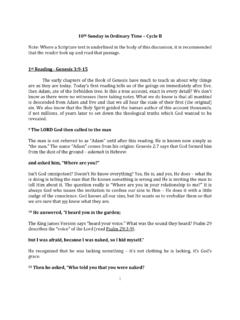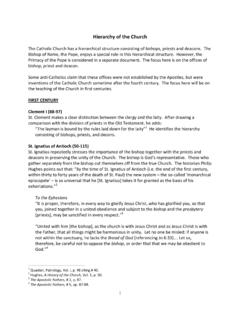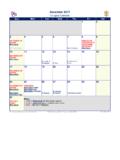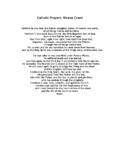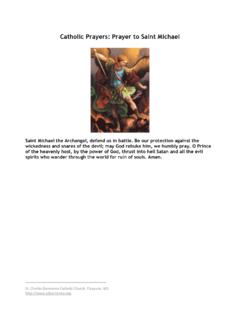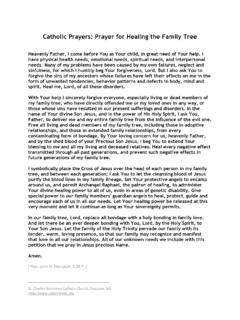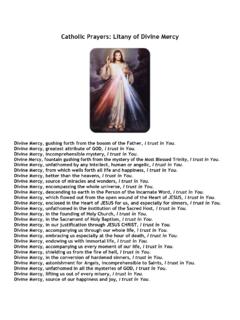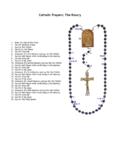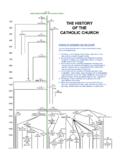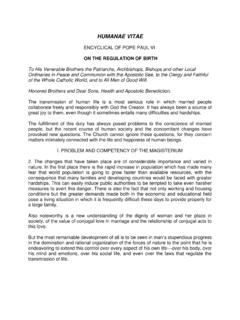Transcription of 1st Sunday of Lent - Cycle C
1 1st sunday of lent cycle c . Note: Today those who are participating in the Rite of Christian Initiation of Adults ( ) and are preparing for participation in the sacraments of the Church for the first time at the Easter Vigil Mass this year have a ceremony called the Rite of Election. Between now and Easter they are called The Elect. Note: Where a Scripture text is underlined in the body of this discussion, it is recommended that the reader look up and read that passage. Introduction lent originated in the early Church as a season for the preparation of those desiring baptism. From early times the account of the history of salvation played an important part in the preparation for baptism. Through our baptism we embraced the new and eternal covenant with God brought into being by Christ's death and resurrection.
2 Ours is not the only covenant God made with man. The covenants of the Old Testament (Old Covenant) are a great help in understanding what God has done for us in His New Covenant. Consequently, in her preparation for Easter, the Church remembers the covenants of the Old Testament to remind us of the stages of God's plan for our redemption and also to instruct those to be baptized. lent has always been a teaching season, a time to reflect on the mighty acts of God in the history of the world, on the covenant between God and His children, and on the role of our older brother Jesus in the story of salvation. lent might be called a primer course in the Christian faith.. The epistle readings for lent , unlike those of many other times of the year, do form a unity with the other two readings as we go through an annual telling of the covenant story.
3 1st Reading - Deuteronomy 26:4-10. Our Old Testament reading recalls the ancient creed of Israel. When we hear this creed, notice that it is a recalling of how God has acted for His people. Our belief comes from our story, our history which is the history of the Jewish people of the Old Testament as well as the Christians of the New. We believe as Christians because it is through recalling our history we become sensitive to how God has acted and is now acting in our lives and in the lives of all His children. In other words, our belief in God comes from recalling the story of God's saving acts. This belief leads to the statement in our creed I believe. From such a statement comes in turn the willingness to make our covenant with this God who is so active in our history.
4 I will be your instrument of history-making in your world. I will judge my actions by my belief that you are a just and loving God who calls all creation into 1. wholeness and oneness with you. I will do whatever you tell me. You are my God (my Father) and I am one of your people (your child). [Moses spoke to the people, saying:] 4 The priest shall then receive the basket from you and shall set it in front of the altar of the LORD, your God. 5 Then you shall declare before the LORD, your God, My father was a wandering Aramean who went down to Egypt with a small household and lived there as an alien. Aram was a son of Shem, Noah's firstborn son. The word Aram means high, or highlands, and as the name of a country denotes that elevated region extending from the northeast of Palestine to the Euphrates.
5 It corresponded generally with the Syria and Mesopotamia of the Greeks and Romans. Jacob (Israel) is a key figure in the early history of the people of Israel and the reference to him here not by name, but as a wandering Aramean underlines the contrast between the miserable circumstances of Israel earlier and settlement in the promised land. Jacobs' descendents could be called Arameans because his wives (Leah and Rachael) were Arameans (Genesis 29-30). But there he became a nation great, strong and numerous. 6 When the Egyptians maltreated and oppressed us, imposing hard labor upon us, Notice the change from he to us. This change in person is significant. The Hebrews have a common historical heritage and tradition: My father was Israel therefore I am Israel.
6 7 we cried to the LORD, the God of our fathers, and he heard our cry and saw our affliction, our toil and our oppression. Divine action in response to prayer 8 He brought us out of Egypt with his strong hand and outstretched arm, with terrifying power, with signs and wonders. 9 and bringing us into this country, he gave us the land flowing with milk and honey. This is Passover terminology. Recall that for this to happen, the sacrifice had to be made, the blood sprinkled, the meat roasted and eaten, and the remainder burned. The feast of Passover (unleavened bread) was to be celebrated annually (Exodus 12:42-51). 10 Therefore,I have now brought you the first fruits of the products of the soil which you, O LORD, have given me.
7 '. This is a reference to the Feast of Pentecost (first fruits of the grain harvest, fifty days after Passover) (see Exodus 13:1-13). And having set them before the LORD, your God, you shall bow down in his presence.. 2. Verse 11, which immediately follows today's reading says Then you and your family, together with the Levite and the aliens who live among you, shall make merry over all these good things which the LORD, your God, has given you.. A family celebration will take place in which all will joyfully participate in the liturgy of covenant renewal. Likewise, we should joyfully participate in our renewal of the covenant;. the Eucharistic celebration with its associated historical stories and creed: actions we take in the Lord's name.
8 Our celebration of the Eucharist has little meaning without the background of history, creed, covenant, and action. That is why we all must see the Eucharist in its proper context. It cannot be an isolated event that is stuck into one's weekly schedule. Rather, it is a binding together in a family meal of our common history and creed as we declare You are my God and we are your people.. 2nd Reading - Romans 10:8-13. Just as in our first reading we heard the ancient creed of Israel, in this second reading we hear the confession of faith of the believers of Christ. 8 But what does it say? The word is near you, in your mouth and in your heart . Quoted from Deuteronomy 30:14. (that is, the word of faith that we preach), 9 for, if you confess with your mouth One must verbalize the basic Christian confession of faith and mean it.
9 That Jesus is Lord The Creedal (if not baptismal) formula of the early Palestinian Church (see also 1. Corinthians 12:3; Philippians 2:11). and believe in your heart An inward faith is required; one that will guide the whole person. Note that a verbal assent to that faith is also required. that God raised him from the dead, you will be saved. The activity of the Father in Christ's resurrection. In the opening line of our reading was a quotation from Deuteronomy the word is near you Jesus is the word; this is how the Jews will escape presumption sacrifices which will not lead to salvation. 10 For one believes with the heart and so is justified, 3. Righteous made right with God; innocent of any charges, made (not declared, but actually made) pure.
10 And one confesses with the mouth and so is saved. The whole process, from its beginning in faith, through the whole Christian life of the works of love on earth, to its completion in heaven. Protestants look at being saved as the initial step like getting into Noah's ark of salvation not the whole journey. Faith, which leads to righteousness, for the Catholic is one of the three theological virtues (faith, hope, love), faith being intellectual belief. To Luther, faith meant accepting Christ with your whole heart and soul. Catholics use salvation in a bigger sense and faith in a smaller sense than do Protestants. We must be careful to define our terminology when we deal with others so as not to confuse them. 11 For the scripture says, No one who believes in him will be put to shame.
